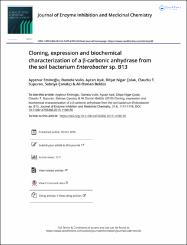Cloning, expression and biochemical characterization of a beta-carbonic anhydrase from the soil bacterium Enterobacter sp B13

Göster/
Erişim
info:eu-repo/semantics/openAccessTarih
2016Yazar
Eminoğlu, AyşenurVullo, Daniela
Aşık, Aycan
Çolak, Dilşat Nigar
Supuran, Claudiu T.
Çanakçı, Sabriye
Belduz, Ali Osman
Üst veri
Tüm öğe kaydını gösterKünye
Eminoğlu, A., Vullo, D., Aşık, A., Çolak, D. N., Supuran, C. T., Çanakçı, S., & Osman Beldüz, A. (2016). Cloning, expression and biochemical characterization of a β-carbonic anhydrase from the soil bacterium Enterobacter sp. B13. Journal of enzyme inhibition and medicinal chemistry, 31(6), 1111–1118. https://doi.org/10.3109/14756366.2015.1100176Özet
A recombinant carbonic anhydrase (CA, EC 4.2.1.1) from the soil-dwelling bacterium Enterobacter sp. B13 was cloned and purified by Co2+ affinity chromatography. Bioinformatic analysis showed that the new enzyme (denominated here B13-CA) belongs to the beta-class CAs and to possess 95% homology with the ortholog enzyme from Escherichia coli encoded by the can gene, whereas its sequence homology with the other such enzyme from E. coli (encoded by the cynT gene) was of 33%. B13-CA was characterized kinetically as a catalyst for carbon dioxide hydration to bicarbonate and protons. the enzyme shows a significant catalytic activity, with the following kinetic parameters at 20 degrees C and pH of 8.3: k(cat) of 4.8 x 10(5) s(-1) and k(cat)/K-m of 5.6 x 10(7) M-1 x s(-1). This activity was potently inhibited by acetazolamide which showed a K-l of 78.9 nM. Although only this compound was investigated for the moment as B13-CA inhibitor, further studies may reveal new classes of inhibitors/activators of this enzyme which may show biomedical or environmental applications, considering the posssible role of this enzyme in CaCO3 biomineralization processes.

















